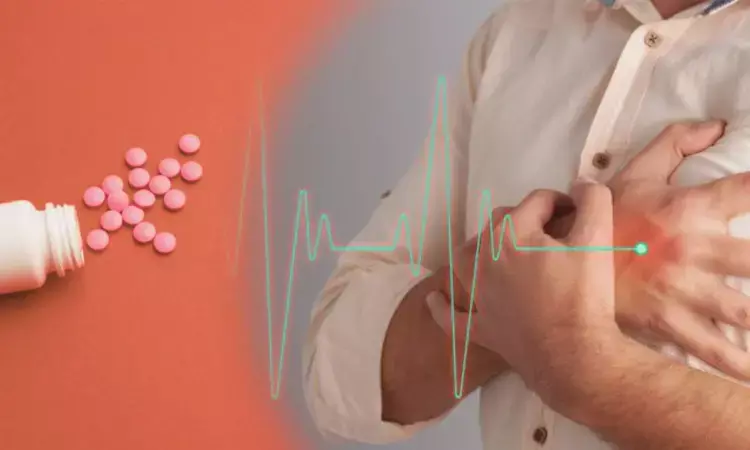- Home
- Medical news & Guidelines
- Anesthesiology
- Cardiology and CTVS
- Critical Care
- Dentistry
- Dermatology
- Diabetes and Endocrinology
- ENT
- Gastroenterology
- Medicine
- Nephrology
- Neurology
- Obstretics-Gynaecology
- Oncology
- Ophthalmology
- Orthopaedics
- Pediatrics-Neonatology
- Psychiatry
- Pulmonology
- Radiology
- Surgery
- Urology
- Laboratory Medicine
- Diet
- Nursing
- Paramedical
- Physiotherapy
- Health news
- Fact Check
- Bone Health Fact Check
- Brain Health Fact Check
- Cancer Related Fact Check
- Child Care Fact Check
- Dental and oral health fact check
- Diabetes and metabolic health fact check
- Diet and Nutrition Fact Check
- Eye and ENT Care Fact Check
- Fitness fact check
- Gut health fact check
- Heart health fact check
- Kidney health fact check
- Medical education fact check
- Men's health fact check
- Respiratory fact check
- Skin and hair care fact check
- Vaccine and Immunization fact check
- Women's health fact check
- AYUSH
- State News
- Andaman and Nicobar Islands
- Andhra Pradesh
- Arunachal Pradesh
- Assam
- Bihar
- Chandigarh
- Chattisgarh
- Dadra and Nagar Haveli
- Daman and Diu
- Delhi
- Goa
- Gujarat
- Haryana
- Himachal Pradesh
- Jammu & Kashmir
- Jharkhand
- Karnataka
- Kerala
- Ladakh
- Lakshadweep
- Madhya Pradesh
- Maharashtra
- Manipur
- Meghalaya
- Mizoram
- Nagaland
- Odisha
- Puducherry
- Punjab
- Rajasthan
- Sikkim
- Tamil Nadu
- Telangana
- Tripura
- Uttar Pradesh
- Uttrakhand
- West Bengal
- Medical Education
- Industry
Use of SGLT-2 inhibitors for HF management safe and well tolerated in adult congenital heart disease patients: Study

USA: A recent study showed that sodium-glucose transporter 2 inhibitors (SGLT-2i) use appears safe and well tolerated in a small cohort of the adult congenital heart disease (ACHD) population, including patients with complex congenital heart disease.
The findings, published in the International Journal of Cardiology Congenital Heart Disease, add to the literature on the SGLT-2i use in patients with ACHD. According to the authors, the study is the first to evaluate SGLT-2i in a complex ACHD cohort that included patients with single ventricle circulation.
"We found that SGLT2i initiation was well tolerated during short-term follow-up," the researchers wrote. "Specifically, there was no significant worsening of renal function or reduction in blood pressure after initiation of SGLT-2 inhibitors in a heterogenous group of ACHD patients."
SGLT2 inhibitors have shown efficacy and safety in heart failure (HF) patients. However, evidence is limited on the use of SGLT-2i in adult congenital heart disease patients with heart failure. To fill this knowledge gap, Ahmed Kheiwa, Loma Linda University, Loma Linda, CA, USA, and colleagues sought to evaluate the safety of this therapy in a small cohort of ACHD patients.
For this purpose, they performed a retrospective, single-centre analysis of 18 patients (>18 years of age) with ACHD and an HF diagnosis who were initiated on an SGLT2 inhibitor. Patient characteristics, including vital signs, concomitant medications, laboratory values, echocardiograms, and clinical outcomes, were obtained as a part of standardized clinical care at an ACHD program before and 2–6 months after initiation of SGLT-2i.
The primary outcome was to demonstrate the safety of SGLT-2i initiation via potential changes in systolic blood pressure, serum creatinine, and serum sodium.
The study revealed the following findings:
- Of the 18 patients, 11 had moderate complexity congenital heart disease, while 7 had great complexity congenital heart disease.
- Post initiation, there were no significant differences in systolic blood pressure (121.8 ± 20.8 mmHg to 114.4 ± 14.9 mmHg), creatinine level (0.85 ± 0.18 mg/dL to 0.89 ± 0.18 mg/dL), and sodium level (138.7 ± 2.9 mMol/L to 138.0 ± 2.2 mMol/L).
- There was a statistically significant weight decline (78.9 ± 22.9 kg to 76.0 ± 23.0 kg) but without a statistically significant change in NT-pro NBP (1358.2 ± 2735.0 pg/mL to 601.6 ± 786.1 pg/mL).
The researchers report that the use of SGLT-2i in their small cohort of patients with heterogenous ACHD appears safe and well tolerated.
"The safety and potential efficacy of SGLT-2i in patients with adult congenital heart disease will require further evaluation in large-scale prospective multicenter studies," they concluded.
Reference:
Kheiwa, A., Ssembajjwe, B., Chatta, P., Nageotte, S., & Abramov, D. (2024). Safety of SGLT-2 inhibitors in the management of heart failure in the adult congenital heart disease patient population. International Journal of Cardiology Congenital Heart Disease, 100495. https://doi.org/10.1016/j.ijcchd.2024.100495
Dr Kamal Kant Kohli-MBBS, DTCD- a chest specialist with more than 30 years of practice and a flair for writing clinical articles, Dr Kamal Kant Kohli joined Medical Dialogues as a Chief Editor of Medical News. Besides writing articles, as an editor, he proofreads and verifies all the medical content published on Medical Dialogues including those coming from journals, studies,medical conferences,guidelines etc. Email: drkohli@medicaldialogues.in. Contact no. 011-43720751


